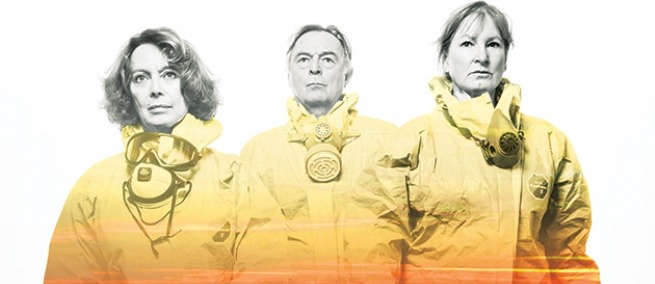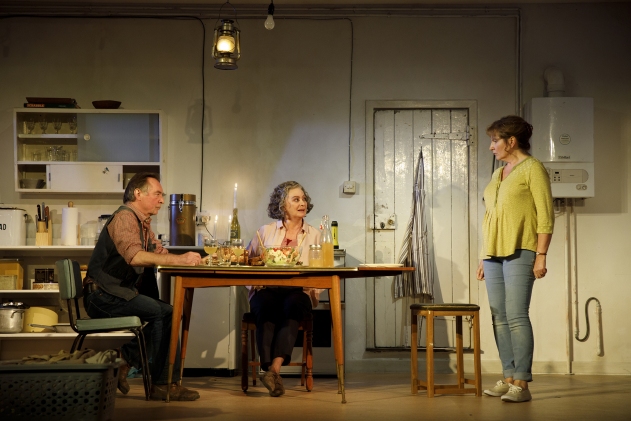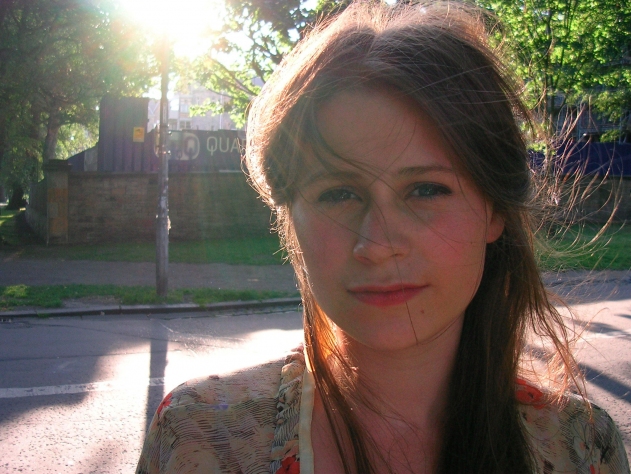
In a small cottage located nearby a nuclear power plant on the sparsely populated East coast of Britain, the three characters in Lucy Kirkwood’s play THE CHILDREN drink only bottled water and pass a Geiger counter over any objects brought in from the outside. Now in their 60s, nuclear physicists Rose, Hazel, and Robin once worked together at the nuclear power station. Rose is visiting the couple Hazel and Robin after a wave has flooded the station causing a meltdown and widespread radiation exposure. “Retired people are like nuclear power stations. We like to live by the sea,” Hazel says. Tensions rise and fall, like the sound of waves crashing outside the cottage, during Kirkwood’s precisely written, masterfully acted play.
THE CHILDREN stars three award-winning actors: Francesca Annis (Lady Macbeth in MACBETH by Roman Polanski), Ron Cook (FAITH HEALER by Brian Friel), and Deborah Findlay (TOP GIRLS by Caryl Churchill). Each of their characters makes sacrifices for the next generation. James Macdonald, who has produced numerous Caryl Churchill plays and is the former director of The Royal Court Theatre, directs.
First produced by the Royal Court Theatre in London in November of 2016, THE CHILDREN opened at the Manhattan Theatre Club’s Samuel J. Friedman Theatre in December of 2017 to much acclaim. Olivier Award winning playwright Lucy Kirkwood’s previous work, MOSQUITOES, was commissioned by the Sloan Foundation’s partnership with Manhattan Theatre Club and produced at the National Theatre in London in 2017. MOSQUITOES also features scientists as characters including a physicist working at the Large Hadron Collider looking for new physics by smashing together subatomic particles.
Science & Film spoke with Kirkwood, who is based in London, by phone in January, 2018. THE CHILDREN is on Broadway through February 4.
Science & Film: Both MOSQUITOES and THE CHILDREN feature scientists as characters. What aspect of being a scientist interests you?
Lucy Kirkwood: What I became interested in was how lay people interact with science. With THE CHILDREN I was thinking [about how] even scientists are people who have lovers, and husbands, and wives, and children. I was much more interested in the domestic, psychological, romantic, and philosophical aspects of those people rather than necessarily their professions, although their professions are where their power lies. I’m quite interested in science as power.
S&F: Did you give any specific direction to the actors as to how to play a scientist?
LK: I don’t give direction to actors at all really. First, because that’s more of the director’s role and second, what you want is for the person to bring the character to life. I’m lucky enough to work with actors of such an extraordinary caliber that they tell me much more about the characters than I can tell them.

Photo © Joan Marcus, 2017
S&F: Was there any research in particular that helped you understand nuclear energy?
LK: I always think you do the amount of research that allows you to write the play credibly. The research isn’t the reason for writing the play. When we were rehearsing the original production we had a really brilliant nuclear engineer come in and talk to us. I did read Chernobyl Prayer by Svetlana Alexievich. It’s a book about Chernobyl and what happened afterward. It is a brilliant book–it’s worth reading in it’s own right. Beyond that, I have to say there was less time spent on scientific research for THE CHILDREN than MOSQUITOES.
I had a very long process writing [MOSQUITOES]. I read a lot of books and tried to absorb a lot of science and have retained probably one percent of it. Right at the beginning [the Sloan Foundation and Manhattan Theatre Club] sent me off down to the particle collider down in Brookhaven.
S&F: Why did you choose nuclear power as a subject?
LK: I’m not fundamentally that interested in the ins and outs of nuclear power. The play itself is not a sort of debate about the rights and wrongs of it. What happened is that I had been trying to write about the environment more broadly for a really long time and I’d been struggling to find the form and the dramatic vessel for that. Then Fukushima happened in 2013 and I read about the nuclear task force going back to help out. Suddenly, it became very clear in my head that there was a way of talking about human intervention in the environment, the brilliant inventions that our brains have created over the course of human history, and what the consequences, responsibilities, and expected outcomes of those are and how to grapple with them. I think this is something we are dealing with in a much broader way in our culture right now. So the nuclear power station became a really handy metaphor for all such things.
S&F: There was one line from THE CHILDREN that stuck out for me: Hazel is talking to Rose about meeting a geneticist and describing her work to him. She laughs at how he pretended to know what she was talking about in this “dumb show of comprehension.” Where did that phrase come from?
LK: At certain times we’ve all done that when confronted with something we feel we should understand and don’t. I think that particular story is probably about a man of a certain generation as well. There is a gender distinction–I hesitate to use the word “mansplaining” because I find it terrible, but I think there’s an aspect of that here–of course I understand what you’re saying, because I am infinitely more knowledgeable. And actually the joy of the moment is when Hazel is much cleverer than him. I think we all know what that looks like, whatever our profession is, of being in a conversation with someone who has just pretended to understand and doesn’t actually understand.
S&F: With THE CHILDREN playing in both the UK and US–you have the same fantastic actors–have you noticed any major differences in the audience response?
LK: I’m very glad that we didn’t try and do an Americanized production of it. [Manhattan Theatre Club] programmed the play shortly before Trump pulled out of the Paris Climate Accord, and I have no desire to make lecturing theatre. I’m not interested in doing that. I think those conversations are really alive in both countries, and across the Western world at the moment, so that felt in some ways very similar. It’s always interesting to me to note where the different laughs are, where the different moments of connection are. I notice [in New York] there is a bigger response to a set up, punch line structure; I think it’s much more in the culture. That’s a tiny observation, it’s not particularly significant, but it’s just sort of interesting once you’ve been to one production of the play and seen it mounted you have stored in your body the audience response so you notice when it comes in different places. It’s been a really interesting experiment actually to transfer the play, and bring it to that different audience and see where the similarities are and the differences.

Lucy Kirkwood’s THE CHILDREN is playing at the Samuel J. Friedman Theatre on Broadway through February 4. Kirkwood has won numerous awards for her plays, including the Laurence Olivier Award for Best New Play for her 2013 work CHIMERICA. Kirkwood’s play MOSQUITOES was supported through the Sloan Foundation’s partnership with Manhattan Theatre Club to develop new plays with scientific themes and characters.
TOPICS